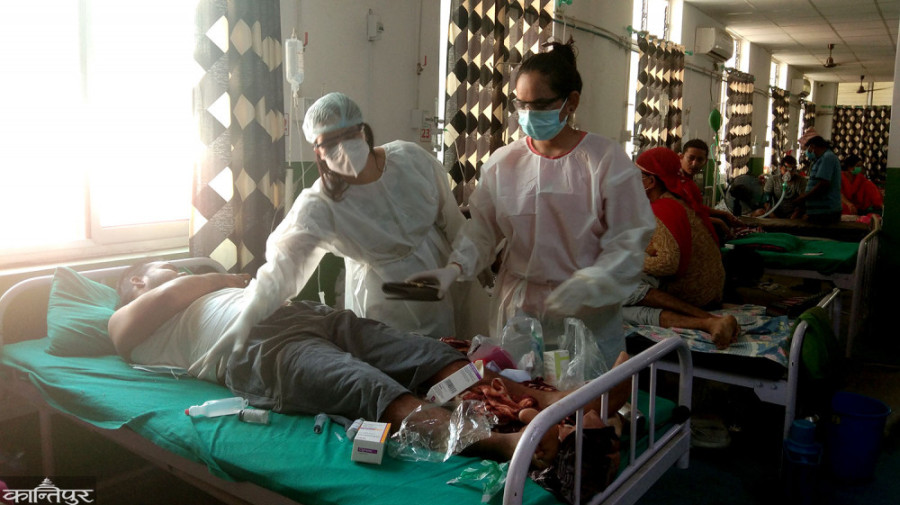Columns
Modern-day Neros
Our political leadership’s abdication of responsibility borders on criminality.
Amish Raj Mulmi
There’s a simmering rage inside of me. It’s born out of the helplessness and anxiety that’s all around us. It’s directed at our people, who could not resist the lures of the Bisket Jatra, the Seto Macchindranath Jatra, the Ram Navami celebrations and the Sindoor Jatra, despite the terrible visuals and news coming out of India.
It’s directed at the global vaccine apartheid, where rich countries, particularly the US, have decided to keep vaccines for themselves. It’s directed at the Indian government under the Bharatiya Janata Party, whose leaders allowed, and even encouraged, mass gatherings of millions at the Kumbh Mela and in the state elections. It’s directed at the many INGOs and ‘development organisations’, for whom Nepal is rich fodder to publish report after report, but have withdrawn into their shells when a pandemic of this scale has hit us.
But above all, my rage is directed at our political class, who have made an absolute mockery of what it means to rule, and our government that discarded science and the warnings of medical professionals for us to arrive at this juncture. Now, oxygen and hospital beds are in short supply, the numbers of the dead are rising, while ordinary people stood in a queue for hours, jostling among crowds, to get a shot that just might be the difference between dying and living.
For the past several days, my Twitter feed has turned into a doomscroll, and every tweet of despair coming out of India was a blaring sign for Nepal to take note and prepare. But no, our political class was busy with their own machinations. We were all passengers in an aircraft that was doomed to crash while the pilots were busy arguing about who should hold the controls. Our media encouraged our leaders’ lack of empathy by continuing to report on their shenanigans and giving it prime importance, but what it needed to do was to amplify the medical community’s pleas.
It was not as if we could not see. We got lucky last year, and we had a year to prepare. The news coming out of Nepalgunj and Birgunj could not have made it clearer. How could Nepal have escaped the tsunami that engulfed India? But no, our prime minister was busy inaugurating a symbol of our phallic obsession, and dishing out guava leaves as a cure. Our Supreme Court allowed the Bisket Jatra to go ahead. Our tourism minister said he would not enforce Covid-19 protocols until it was published in the Nepal Gazette. Our leaders in the opposition, gleefully rubbing their hands to profit off this government’s shaky position, did not utter a single word. And now, even as lockdowns have been imposed, provincial governments have decided to indulge in petty squabbles, including fake positive reports (perhaps they’ve learnt from the best!). The Rato Macchindranath Jatra is yet to come, an ominous cloud over our heads.
This is not misgovernance. This is an abdication of responsibility that borders on criminality. One could not have imagined a government that could respond to a crisis worse than in the aftermath of the 2015 earthquake, and yet, here we are, teetering on the edge of collapse, with the pandemic spreading quicker than in India. ‘In whichever direction I turned, I saw darkness,’ wrote Indian writer Suryakant Tripathi ‘Nirala’ when several members of his family died in the 1918 influenza pandemic. A hundred years later, that is once again our truth.
A suitable response did not require vast amounts of imagination or resources. Isolation centres needed to be set up at the border points and in the cities, just as last year. Local authorities needed to be directed to isolate those in quarantine who had returned home. The festivals should not have been allowed to go on (what is a year for a deity who measures time in aeons?). Resources needed to be diverted to the medical centres. Testing needed to be expanded. Masks had to be made compulsory.
But the message that filtered down to the community level from the leadership was one of nonchalance and ignorance, going by the number of times I heard corona ta gaisakyo. The community has its own share of responsibility, yes, but ultimately the public will only follow what the leaders suggest.
Valley authorities learnt from their mistakes by giving migrant workers time to leave urban centres before the lockdown was imposed, but more needs to be done. One example, as an editorial in the Post suggested, is to set up soup kitchens for the disadvantaged.
Weaker nutrition will result in increased fatalities, as historian Chinmay Tumbe has shown in Age of Pandemics, a history of the cholera, plague and influenza pandemics between 1820-1920 in the subcontinent. Tumbe approximates almost 20 million died in the subcontinent during the 1918-19 flu pandemic, and because of a preceding drought, food prices had gone up. ‘India’s massive mortality shock, then, was not entirely bad luck...but at least partly attributable to inefficient food supply management.’ Can our private sector step up and provide a lesson in generosity here?
Tumbe also notes that mismanagement of the influenza pandemic gave momentum to new political forces, such as the rise of Mahatma Gandhi after 1918-20. Our political class would do well to pay heed to such warning signs. History has a cruel way of repeating itself, and today’s rulers may very well be out of a job tomorrow. As our leaders very well know, revolutions are born in the aftermath of crises, and Nepal is no stranger to revolutions.




 20.53°C Kathmandu
20.53°C Kathmandu















